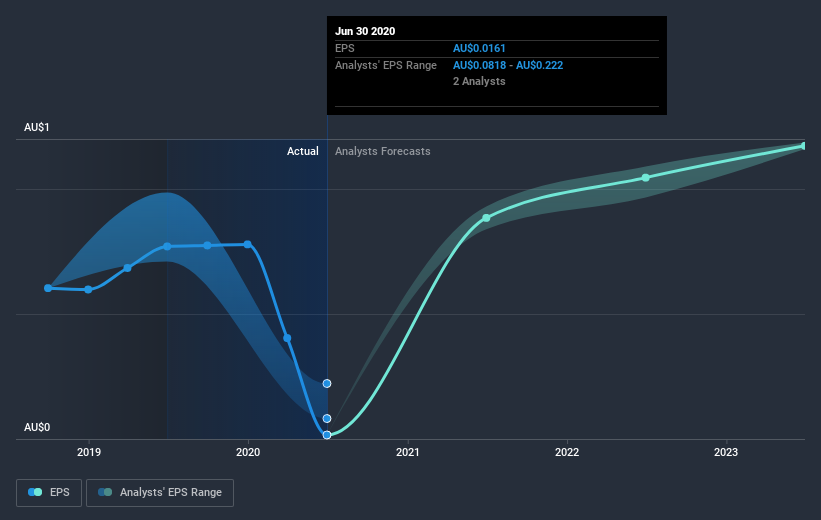McMillan Shakespeare's (ASX:MMS) Shareholders Are Down 49% On Their Shares

Passive investing in an index fund is a good way to ensure your own returns roughly match the overall market. Active investors aim to buy stocks that vastly outperform the market - but in the process, they risk under-performance. For example, the McMillan Shakespeare Limited (ASX:MMS) share price is down 49% in the last year. That contrasts poorly with the market decline of 7.2%. To make matters worse, the returns over three years have also been really disappointing (the share price is 44% lower than three years ago). More recently, the share price has dropped a further 9.4% in a month. This could be related to the recent financial results - you can catch up on the most recent data by reading our company report.
View our latest analysis for McMillan Shakespeare
In his essay The Superinvestors of Graham-and-Doddsville Warren Buffett described how share prices do not always rationally reflect the value of a business. One way to examine how market sentiment has changed over time is to look at the interaction between a company's share price and its earnings per share (EPS).
Unfortunately McMillan Shakespeare reported an EPS drop of 98% for the last year. This was, in part, due to extraordinary items impacting earnings. This fall in the EPS is significantly worse than the 49% the share price fall. It may have been that the weak EPS was not as bad as some had feared. Indeed, with a P/E ratio of 525.69 there is obviously some real optimism that earnings will bounce back.
The graphic below depicts how EPS has changed over time (unveil the exact values by clicking on the image).
We consider it positive that insiders have made significant purchases in the last year. Even so, future earnings will be far more important to whether current shareholders make money. Before buying or selling a stock, we always recommend a close examination of historic growth trends, available here..
What about the Total Shareholder Return (TSR)?
We've already covered McMillan Shakespeare's share price action, but we should also mention its total shareholder return (TSR). The TSR attempts to capture the value of dividends (as if they were reinvested) as well as any spin-offs or discounted capital raisings offered to shareholders. McMillan Shakespeare's TSR of was a loss of 47% for the year. That wasn't as bad as its share price return, because it has paid dividends.
A Different Perspective
We regret to report that McMillan Shakespeare shareholders are down 47% for the year. Unfortunately, that's worse than the broader market decline of 7.2%. However, it could simply be that the share price has been impacted by broader market jitters. It might be worth keeping an eye on the fundamentals, in case there's a good opportunity. Unfortunately, last year's performance may indicate unresolved challenges, given that it was worse than the annualised loss of 2.8% over the last half decade. We realise that Baron Rothschild has said investors should "buy when there is blood on the streets", but we caution that investors should first be sure they are buying a high quality business. It's always interesting to track share price performance over the longer term. But to understand McMillan Shakespeare better, we need to consider many other factors. Even so, be aware that McMillan Shakespeare is showing 3 warning signs in our investment analysis , you should know about...
McMillan Shakespeare is not the only stock that insiders are buying. For those who like to find winning investments this free list of growing companies with recent insider purchasing, could be just the ticket.
Please note, the market returns quoted in this article reflect the market weighted average returns of stocks that currently trade on AU exchanges.
This article by Simply Wall St is general in nature. It does not constitute a recommendation to buy or sell any stock, and does not take account of your objectives, or your financial situation. We aim to bring you long-term focused analysis driven by fundamental data. Note that our analysis may not factor in the latest price-sensitive company announcements or qualitative material. Simply Wall St has no position in any stocks mentioned.
Have feedback on this article? Concerned about the content? Get in touch with us directly. Alternatively, email editorial-team@simplywallst.com.



